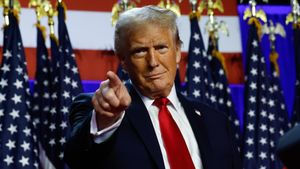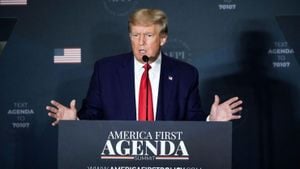Relations between the United States and China are at a pivotal moment, characterized by simmering tensions and complex geopolitical dynamics. From trade disputes to military maneuvers, the interactions between these two powers have significant ramifications, particularly for Taiwan, which remains at the heart of the U.S.-China relationship.
A more cautious approach to U.S. foreign policy has been suggested by historian Stephen Wertheim, who recently articulated his views in The New York Times. Wertheim's recommendation centers on reinforcing the "one China" policy and advising the next U.S. president to provide Taiwan with support, albeit conditional. This strategy aims to prioritize American interests amid burgeoning concerns over China's assertiveness.
Nonetheless, Wertheim's assumptions about Taiwan and its relationship with China have faced criticism. Taiwan News highlights three fundamental flaws in his views. First is the perception of China's supposed tolerance for Taiwan's self-rule. Historically, Beijing has never fully recognized Taiwan's autonomy, viewing it as part of its territory. Wertheim's claims fail to acknowledge the nuanced and often hostile intent behind China's approach, which has historically oscillated between pragmatism and aggression.
Chinese leadership under Xi Jinping has taken a more aggressive stance, evidenced by increased military incursions near Taiwan and expanded operations throughout the South China Sea. This stark shift suggests China no longer accommodates the status quo of Taiwanese governance but instead expresses impatience for reunification.
The second significant flaw pertains to Wertheim's belief about U.S. influence over Taiwan's fate. He posits the U.S. bears responsibility for fostering conditions for peace, overlooking the determination of the Taiwanese people to maintain their democratic values and sovereignty. Taiwan's population has consistently resisted Beijing's overtures for reunification, prompted by the erosion of Hong Kong's autonomy and fueled by its own cultural and political identity.
Finally, Wertheim's notion of negotiating a grand bargain with China by exchanging concessions for cooperation underestimates the intrinsic nationalism driving Beijing's policies. The Chinese Communist Party's legitimacy hinges on its narrative of restoring China's rightful place on the global stage, which views any U.S. attempts to assert dominance as direct challenges. Consequently, concessions perceived as signs of weakness could backfire, encouraging Beijing to increase its demands.
Meanwhile, at the U.S.-China Hong Kong Forum, former U.S. Trade Representative Charlene Barshefsky underscored the importance of stabilizing trade relations. She emphasized the need for rational approaches amid the rising tide of populism and nationalism affecting both countries. According to Barshefsky, China has shifted priorities, placing national security above economic concerns and moving aggressively toward self-sufficiency.
The interplay of these factors continues to create complexity within U.S.-China relations. Stephen Roach, another key voice at the forum, warned of possible retaliatory measures against the U.S. if it were to increase tariffs, adding layers of tension to trade negotiations. Such shifts affect not only bilateral relations but also influence the broader global economy, prompting fears of trade wars stretching beyond borders.
Despite these challenges, there are glimmers of hope elsewhere. Analysts observing India-China relations note thawing tensions might pave the way for renewed trade ties, especially concerning sectors like electric vehicles. Recent agreements on troop disengagement along their shared border indicate both nations aim to stabilize relations, which could open doors for business cooperation and investments.
This more conciliatory attitude from India toward China may result from India's increased scrutiny of Chinese investments following border clashes, which previously strained relationships. Acknowledging this shift is important, as it signifies potential for mutual benefits drawn from enhanced economic cooperation between Asia's two largest economies.
Overall, the path forward for U.S.-China relations remains uncertain, with intertwining interests and conflicting aspirations. The interactions between these nations will shape economic and geopolitical landscapes for many years to come, particularly as they navigate issues surrounding Taiwan's autonomy and the strategic ambitions of both the U.S. and China.
While strategic analyses and historical perspectives are important, tangible impacts on the everyday lives of citizens advancing the dialogue on U.S.-China relations become consequential. Measures taken today will reverberate for generations, underscoring the significance of thoughtful and deliberate policymaking.



